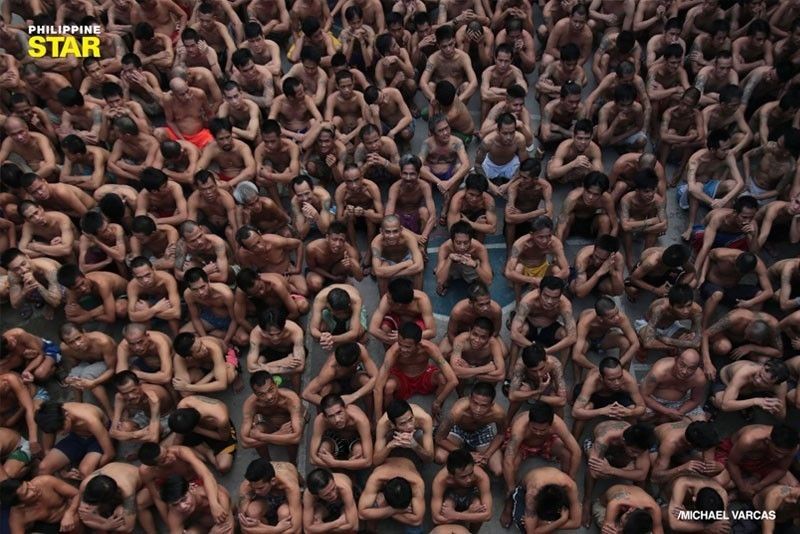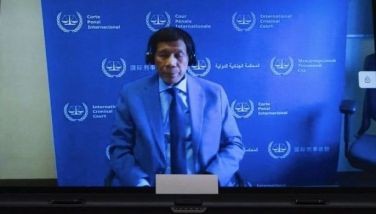GCTA law's revised implementing rules exclude heinous crimes convicts as beneficiaries

MANILA, Philippines — Convicts of heinous crimes are ineligible to benefit from Republic Act 10592 or the Good Conduct Time Allowance law, the measure's newly drafted guidelines stated.
In a press conference Monday, Justice Secretary Menardo Guevarra said the draft Revised Implementing Rules and Regulation of RA 10592 that expanded time allowances for good conduct “enumerated these excluded types from each and every time allowance under GCTA.”
Guevarra said that under the revised rules, inmates who are recidivists, habitual delinquents, escapists and those charged with heinous crimes are ineligible from GCTA.
The press conference was also attended by Interior and Local Government Secretary Eduardo Año who signed the revised IRR with Guevarra.
Outrage on the early release of murderer-rapist Antonio Sanchez through the GCTA prompted the review of the 2013 law's IRR.
Four types of prisoners, including heinous crime convicts, excluded from GCTA law
The justice secretary also said the draft of the revised IRR clarified that the four types of inmates earlier mentioned are disqualified from preventive imprisonment, GCTA and special time allowance for loyalty.
Guevarra, however, clarified that time allowances earned by the inmates before RA 10592 was signed in 2013 are considered earned.
To note, the partial extinction of criminal liability of an inmate, through conditional pardon, commutation of sentence and good conduct allowances, has been included in the Revised Penal Code as early as 1930.
RA 10592 only expanded the time allowances for an inmate’s good behavior while in prison.
EXPLAINER: Good law, bad man: RA 10592 and rape-slay convict Antonio Sanchez
“Under the old law, small time permits are given. Because this GCTA [gave] additional, expanded benefits,” the justice secretary explained in a mix of English and Filipino.
“They earned time conduct under the RPC. What they cannot earn is the additional [time allowance] because of the GCTA law,” he added.
To illustrate: The RPC held that the good conduct of a prisoner, during the first two years of imprisonment shall be entitled to a deduction of five days each month, while under the GCTA law, 20 days will be reduced in the first two years of imprisonment.
Heinous crimes enumerated
The IRR also put down specific crimes considered as heinous, following Supreme Court jurisprudence and RA 7659 or the Heinous Crimes Act, which imposed death penalty on crimes deemed “grievous, odious and hateful offenses.”
Among the crimes listed as heinous under RA 7659 are the following:
- Treason
- Piracy in general and mutiny on the high seas in Philippine waters
- Qualified piracy
- Qualified bribery
- Parricide
- Murder
- Infanticide
- Kidnapping and serious illegal detention
- Robbery with violence against or intimidation of persons
- Destructive arson
- Rape
- Importation, distribution, manufacturing and possession of illegal drugs
Guevarra said the revised IRR would be published in two newspapers of general circulation.
More time to review guidelines
The Department of Justice and the Department of the Interior and Local Government also gave its inter-agency committee an extension of 60-days to review the uniform policy and guidelines for the implementation of the GCTA law.
The inter-agency committee completed the review of the guidelines and submitted a draft Implementing Rules and Regulations of the GCTA law on September 13.
The committee, however, sought the approval of an extension of their mandate to also “review and recommend revisions to the Uniform Manual and Guidelines” for the implementation of the GCTA law.
Guevarra said the manual, which the committee would work on, would contain the computation for on and off good behavior of inmates.
He added that the committee would determine offenses committed by prisoners that might result in their disqualification from the GCTA law.
RELATED: Good behavior? Prison violations, murder convictions mar Sanchez's record
- Latest
- Trending































